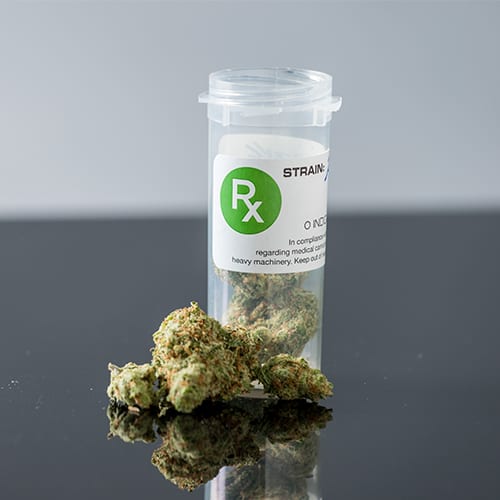
Today we will take a dive into the relationship between Alzheimer’s disease and cannabis. Whether or not this condition has affected your life, the research behind this relationship is yet another indicator that marijuana can be used to help a wide array of conditions. When most of us think of Alzheimer’s, we think of elderly people suffering from dementia in some form or another, or perhaps of a relative who had the disease in their later years. While Alzheimer’s does generally affect older people, early-onset Alzheimer’s can affect people as young as forty or fifty in some cases; 5 percent of people with the disease are younger.
What are the Symptoms of Alzheimer’s?
Many people dealing with Alzheimer’s, whether personally or in someone they know, report mental problems such as memory retrieval, disorganized thinking patterns, dementia, and erratic or repetitious behavior. Alzheimer’s symptoms progress over time, and eventually cause great disruption of daily human functioning and the ability to complete simple tasks that were once easy for the person. Some late-stage patients may lose the ability to communicate and respond to the environment around them altogether – there is a sense of complete isolation, even from the people who love that person the most, and with whom they were previously close. Warning signs of Alzheimer’s include memory loss that disrupts daily life, difficulty in following a plan or problem-solving that was previously easy, difficulty in completing familiar tasks, time or place confusion, trouble with image and spatial interpretation, new oral or written communication problems, misplacing things and an inability to retrace steps, poor judgment, withdrawal from social or work activities, and changes in mood or personality. Although these changes are often normal with age, Alzheimer’s symptoms are more severe.
The Truth About Alzheimer’s Care
According to the Mayo Clinic, Alzheimer’s is the sixth leading cause of death in the United States, and most people with noticeable symptoms live only eight years after Alzheimer’s is diagnosed; there is no cure. Women in their 60s are 50% more likely to develop Alzheimer’s than breast cancer during their remaining years of life. The disease devastates families, leaving them with little help in caring for aging parents or relatives who can no longer care for themselves – the cost of good care for an Alzheimer’s patient in the United States can often be upward of $73,380 for a semi-private room in a nursing home annually, according to the Alzheimer’s Association. A private room in a nursing home facility with basic services for an Alzheimer’s patient costs about $87,600 per year, and an assisted living facility residence is $42,000.

The emotional responses of Alzheimer’s patients are often aggressive, fearful, or depressed – the deterioration of relationships as the patient becomes unable to recognize loved ones, or creates new relationships without a memory of those which already exist, can be traumatizing for family members and spouses. The chairman of the medical advisory board at the Alzheimer’s Foundation, Richard Powers, noted that new emotional relationships are “common enough that we need to be able to deal with [them] in a thoughtful and compassionate way,” speaking of two Alzheimer’s patients who find a connection. Powers observed that having Alzheimer’s is similar to the experience of a person who woke up in an unknown and strange location, where that person didn’t know anyone and was unfamiliar with the surroundings; this would cause fear and possibly aggression in anyone. Some patients cannot even interpret the language being spoken around them – but finding someone who feels the same way might be the only way to survive. Powers noted that Alzheimer’s patients, although they feel adrift, “[c]ontinue to search for companionship and friendship”, even in nursing homes and assisted living facilities; it’s the nature of being human to seek out other people. Powers cautioned that these emotional relationships are not precisely “falling in love,” noting that falling in love necessitates memory, reason, decision-making, and communication and that many patients no longer have these capabilities.
That’s the bad news. The good news is that research and investigation into the disease has become so prevalent that breakthroughs are happening more frequently – and with the legalization of medical and recreational cannabis, research can delve into the positive responses of Alzheimer’s sufferers and cannabis intake, as well.
The Positive Effects of Cannabis on Alzheimer’s Patients
As early as 2006, studies were being conducted on viability of the link between the endocannabinoid system in the brain and Alzheimer’s disease. In 2014, an article published in the Journal of Alzheimer’s Disease found that THC “could be a potential therapeutic treatment option for Alzheimer’s disease through multiple functions and pathways.” In layman’s terms, this means that THC is able to slow or halt certain “hallmark characteristics” of the disease. The presence of the protein Amyloid-β has been linked to Alzheimer’s symptoms, but THC dosing at regular intervals inhibits aggregation in the protein with no observable toxicity or other side effects – it also enhances the function of the body’s mitochondria, known as the “cell’s energy factories”, according to David Downs of SFGate. Aggregation refers to changes in secondary and tertiary protein structure, or plaque formation in the brain, which is common in patients with dementia, according to the University of Berlin. (Think of the plaque that forms in the arteries prior to a heart attack, plaque can also form in the brain.) Chuanhai Cao, a neuroscientist at the University of South Florida’s College of Pharmacy and Byrd Alzheimer’s Institute, observed that “THC is known to be a potent antioxidant with neuroprotective properties” but this study is the first of its kind – the discovery of the enhancement of Alzheimer’s patients by the cannabis derivative is a key to unlocking a mystery that has plagued medical science for generations.
Dr. Cao stated in a University of South Florida article that “[t]his study indicates that THC and THC-related compounds may be of therapeutic value in Alzheimer’s disease.” The Byrd Alzheimer’s Institute is investigating the effects of a “drug cocktail” including THC, caffeine, and other natural compounds, and will begin testing on a genetically-engineered mouse model soon. In a similar study conducted last year, a team of scientific researchers obtained similar results, finding that THC and CBD botanical extracts, both alone and in combination, preserve mouse memory when given during early stages of symptomatic Alzheimer’s disease. The study noted that the anti-inflammatory properties of cannabinoids may also have a positive effect on the Alzheimer’s brain – and both THC and CBD used together had the best effect overall.

We’ve reviewed the opinions of scientists and medical experts on the “possible” effects of cannabis THC and cannabidiols on Alzheimer’s patients, but what about the patients themselves and their families? The creator and author of the Skunk Pharm Research, LLC, known as Graywolf, noted that when her mother’s Alzheimer’s symptoms could no longer be regulated by western medicines, and she became “combative and personal hygiene became an issue,” she was forced to quit her job to care for her mother for the rest of her life. Her regular western medicines included five over-the-counter drugs, three inhalers, pills to control her asthma, blood pressure and allergy medications, anti-psychotics, anti-seizure medication, and three other medications that Graywolf did not know the purpose of. Graywolf’s mother had smoked cannabis recreationally with her daughter for over thirty years, and Graywolf worked with her mother’s doctor to obtain a medical marijuana license for her, and “systematically” remove as many pharmaceutical drugs from her schedule as possible. Graywolf stated that “cannabis was my only means of mitigating [my mother’s] despicable behavior.” Her mother did not like the taste of the cannabis essential oils in any food stuffs, so Graywolf used hash oil in combination with other essential oils, and her mother became happier and less combative over time. Her behavior changed so markedly that Graywolf was able to “get her off of most of the original drug regiment,” and help her into “cognitive changes [that] were unmistakably positive.” Graywolf’s mother began to interact with her family and friends appropriately, and her cognitive thinking seemed to have improved – she even began to play jokes on them. Graywolf claims her mother’s doctor said, “I wish all my Alzheimer’s patients were on cannabis. Look at her quality of life!”
Stories like Graywolf’s are heartening and promising, as are the exciting scientific investigations surrounding cannabis and Alzheimer’s effects on the brain. In the future, with the increasing momentum of cannabis legalization, families like Graywolf’s may be able to tell their stories to federal and state legislatures, and increase funding, acceptance, and use of medicinal and recreational cannabis for Alzheimer’s patients across the globe.
Source – MassRoots





